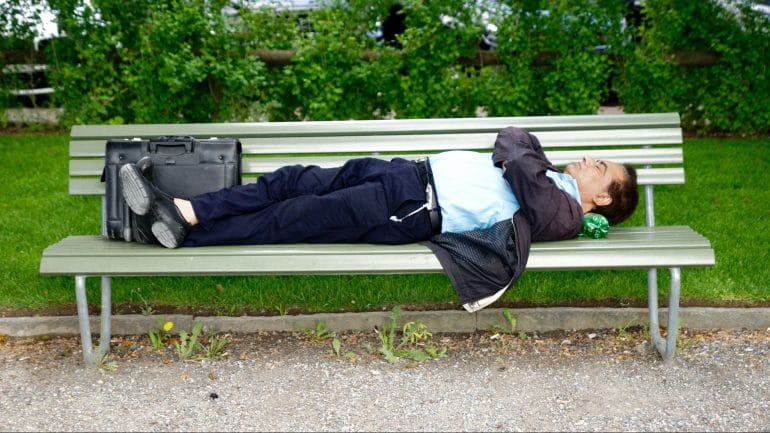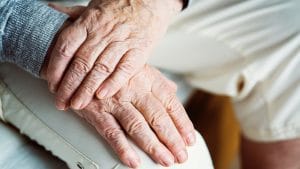Narcolepsy Treatment—Manage Your Symptoms Effectively
written by / May 12, 2022

Narcolepsy is a chronic disease characterized by pronounced drowsiness during the day and an overall inability to remain awake. Patients will suddenly fall asleep regardless of their circumstances and environment.
Unfortunately, the cure for this chronic disorder still hasn’t been found, however, that doesn’t mean there is no such thing as narcolepsy treatment. What’s encouraging is that there are drugs and lifestyle changes that can help manage the symptoms.
What Are the Main Types of Narcolepsy?
The fifth edition of the Diagnostic and Statistical Manual of Mental Disorders (DSM-5) describes the different kinds of narcolepsy. These are categorized according to the signs and underlying causes, as well as the associated symptoms.
1. Narcolepsy Type 2
Previously known as narcolepsy without cataplexy, this type is defined by an orexin deficiency and notable changes in a patient’s sleep phases.
Cataplexy is associated with a partial or complete loss of muscle control, typically brought on by strong emotion. However, no episodes of cataplexy are observed.
Treatment for narcolepsy without cataplexy includes drugs like Modafinil or Armodafinil.
2. Narcolepsy With Cataplexy
In addition to alterations in REM, cataplexy is characteristic of this type of disorder, as the name itself suggests. Meanwhile, the hypocretin levels in the cerebrospinal fluid are normal.
This type accounts for approximately 75% of all narcolepsy cases. The only FDA-approved treatment for it is sodium oxybate.
Other Types
1. Autosomal Dominant Narcolepsy Combined With Obesity and Type 2 Diabetes
This type is determined by mutations of oligodendrocytes in the DNA. These are glial cells involved in the formation of myelin, a substance that helps send nerve impulses. In these cases, there’s also a low concentration of hypocretin in the cerebrospinal fluid.
2. Narcolepsy Secondary to Another Medical Condition
In some cases, a narcolepsy episode could be a direct consequence of the presence of:
- tumors
- trauma
- infections that kill orexin-secreting cells (such as sarcoidosis or Whipple’s disease).
Treatment for Narcolepsy
As we’ve mentioned previously, there’s no cure for narcolepsy. However, patients can manage their symptoms to an extent with certain lifestyle changes.
Moreover, the symptoms can be treated with a variety of drugs. Standard therapies for narcolepsy include stimulant medications and medications that alleviate other accompanying symptoms, such as excessive daytime sleepiness and lack of alertness.
Narcolepsy and Natural Treatment
Medications alone usually aren’t enough to treat the disorder, but should be combined with lifestyle changes.
Sleep Schedule
To help protect themselves from excessive daytime sleeping, people affected by narcolepsy can sleep a little at regular intervals during the day.
The first step in this is creating better sleeping habits that include eight hours of sleep a night and naps during the day. It’s also essential to build a regular sleep regimen for going to bed at night.
Naps
It’s advisable to take two 15-minute naps during the day. We have to emphasize, though, that this approach is still in the experimental phase. However, the results are promising.
Sleep Hygiene
Treating narcolepsy without medication can also imply avoiding:
- smoking
- overeating
- stimulants at least three hours before going to bed.
Also, be sure to:
- exercise every day
- limit alcohol consumption
- eat healthily (and cut down on simple carbohydrates)
- relax before going to bed
- create a peaceful sleep environment.
Sleep-Friendly Bedroom
Maintain a comfortably cool environment in your bedroom, so you don’t wake up often at night.
If you work at night and need to sleep during the day, consider investing in blackout or light-filtering curtains. A sleep mask or white noise machine may also be beneficial.
Wise Use of Electronic Devices
Your circadian rhythm, or sleep-wake cycle, may be affected by blue light. It’s emitted by your:
- tablet
- smartphone
- other electronic gadgets.
It deceives your brain into believing it’s daytime, causing your body to produce less melatonin.
Psychological Help
Narcolepsy treatment options don’t exclusively have to focus on the physical condition. Psychological help can be immensely beneficial: advising the patient, their family, and their employer on the best ways to improve their well-being.
These suggestions should minimize any emotional stress the patient may be experiencing on a daily basis. Educational programs can also be helpful, especially in the form of support groups.
Narcolepsy Treatment Drugs
There are some notable drugs available on the market for narcolepsy. Most of the symptomatic treatments are used to control sleepiness and improve physical and cognitive performance. However, they all depend on the individual patient’s symptoms.
Stimulants
Stimulant medications are known for their use in treating attention deficit hyperactivity disorder but are also effective in reducing drowsiness. Some of them are:
- Modafinil: Several studies have indicated that this medication also reduces excessive daytime sleepiness. The most prevalent side effects are headaches.
- Armodafinil is a medication used to treat excessive daytime drowsiness. The most common adverse effects are headaches and nausea.
- Methylphenidate enhances alertness and helps to decrease excessive daytime sleepiness. Headaches, irritability, gastrointestinal issues, and anxiousness are some of its side effects. Both the quality and duration of night sleep may become compromised. However, there are concerns that if this narcolepsy medicine is used regularly for an extended period, it will become ineffective. As a result, some doctors advise narcoleptics to stop taking it for one day each week (typically on the weekend). Any activity or task that requires absolute focus and wakefulness (such as driving) should therefore be avoided throughout that day.
Pitolisant
This medication was introduced recently by the European Medicines Agency. It belongs in the class of H3 blockers and it’s administered in order to boost adult patients’ wakefulness. The way it achieves that is by upping the brain’s histamine levels.
Naturally, prior to approval, the Committee for Medicinal Products for Human Use has evaluated all the available data on the safety, efficacy, and quality of this drug.
Antidepressants
Tricyclic antidepressants Anafranil and Tofranil and the selective serotonin reuptake inhibitor (SSRI) Prozac are commonly used to lower the frequency of cataplexy.
The side effects are:
- stomach trouble
- dry mouth
- exhaustion
- weight gain
- sexual side effects (like low libido)
- in some instances—abnormal heartbeat.
Stomach discomfort and sexual dysfunction are additional side effects of Prozac and other SSRIs. However, compared to tricyclic antidepressants, side effects tend to be less frequent and may be milder.
Sodium Oxybate
This narcolepsy medication is used to treat a limited number of narcolepsy patients who experience extreme daytime drowsiness and/or cataplexy that does not respond to conventional treatments.
The FDA has approved it as the only treatment for cataplexy. Because of its history of leading to recreational drug addiction, the FDA has listed it as a controlled substance. New treatment options that focus on the hypocretin hormone are currently in the research stage.
Novel treatment methods also include:
- immunotherapy
- gene therapy
- orexin substitution.
Solriamfetol
Narcolepsy is also treated with this dual-acting dopamine and norepinephrine reuptake inhibitor. It has been shown to assist patients in staying awake for extended periods.
What Happens If Narcolepsy Goes Untreated?
Because narcolepsy is not curable, the treatment of this disorder remains focused on the symptoms. Therefore, if left untreated, the condition remains an even more unpleasant experience for the patient.
Narcolepsy can affect psychological, social, cognitive, and developmental function if left undetected or untreated. Furthermore, it can severely interfere with one’s overall quality of life, sabotaging social, family, and work-related activities.
Conclusion
Given the challenging nature of narcolepsy and the ways in which it manifests itself, it’s not surprising that it requires individuals to make drastic adjustments in their lifestyle. Therefore, it’s essential to take some precautions.
Although there’s still no cure for this disorder, narcoleptics and their families should consult medical experts, and educate themselves on the possible treatments and methods to alleviate the symptoms.
FAQs
What triggers narcolepsy?
Many cases of narcolepsy are thought to be caused by a deficiency of hypocretin (also known as orexin), a brain chemical that manages sleep and wakefulness. The immune system is likely to have mistakenly attacked areas of the brain that produce it, thereby causing the deficiency.
Can narcolepsy go away?
Narcolepsy is a lifelong condition, so it usually doesn’t go away as one grows older. Symptoms may improve over time, but they will never completely disappear. Excessive daytime sleepiness, cataplexy, sleep paralysis, and hallucinations are the most common symptoms.
Does caffeine help narcolepsy?
According to the findings of a recent clinical pilot experiment, a low dosage of coffee improves alertness in narcolepsy patients. More extensive trials, however, are needed to support these findings.
What vitamins can help with narcolepsy?
B-complex vitamins help with narcolepsy. There are also other natural remedies, such as cayenne pepper, gotu kola, rosemary tea, guarana, ginkgo biloba, ephedra, etc.
What is the best treatment for narcolepsy?
The primary options are drugs that stimulate the central nervous system and help people stay awake during the day. Doctors frequently start their patients’ narcolepsy treatment with modafinil (Provigil) or armodafinil (Nuvigil).
Modafinil and armodafinil aren’t as addictive as other stimulants, and they don’t create the same types of highs and lows. Headache, nausea, and anxiety are some of the more prevalent side effects.









Warning: Undefined array key "format" in /home/602518.cloudwaysapps.com/cspedpjass/public_html/wp-content/themes/disturbmenot/template-parts/post-item/post-comment.php on line 23
Warning: Undefined variable $commenter in /home/602518.cloudwaysapps.com/cspedpjass/public_html/wp-content/themes/disturbmenot/template-parts/post-item/post-comment.php on line 27
Warning: Trying to access array offset on value of type null in /home/602518.cloudwaysapps.com/cspedpjass/public_html/wp-content/themes/disturbmenot/template-parts/post-item/post-comment.php on line 27
Warning: Undefined variable $commenter in /home/602518.cloudwaysapps.com/cspedpjass/public_html/wp-content/themes/disturbmenot/template-parts/post-item/post-comment.php on line 29
Warning: Trying to access array offset on value of type null in /home/602518.cloudwaysapps.com/cspedpjass/public_html/wp-content/themes/disturbmenot/template-parts/post-item/post-comment.php on line 29